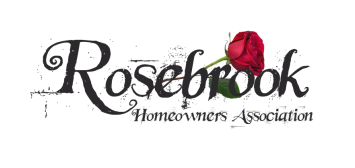
You've searched and researched for the perfect location to raise your family. You've found the perfect neighborhood. Your new home meets all of your goals relating to location, amenities and conveniences. The excitement has peaked, the moment is surreal, and you waste no time adding a few warming touches. First, you paint the front door a pastel to give a welcoming glow and blend with the garden-like setting of your yard, then you add a new wreath to the door. Next you plant your flowerbed with a variety of shrubs and multi-colored flowers, finally adding that personal touch of lamp-bearing statues to compliment the front. You find it most impressive how much more welcoming your home now appears.
Days letter you're excited to receive what you believe to be a welcome letter from your association only to find it stating that your home is “in violation” of the covenants & restrictions! The letter states that the color of your door and the newly-mounted wreath are non-compliant and the garden in which you placed your statues is actually something called the common area and must be removed! When you call the number on the letter, the customer service specialist reminds you that you have purchased a home in a covenant-restricted community association. A bell goes off as you remember the large paperwork you received in your closing papers entitled Homeowners Association Covenants & Restrictions. You easily locate it among the closing documents and begin reading it and quickly realize that it may have been a mistake not to review the information prior to settlement and/or remodeling.
Sound familiar? It happens more often than you know. Purchasing a home in a community association has many benefits, including deed restrictions that govern the community with which every owner should be familiar. It is a lifestyle choice that should be taken seriously when considering this home purchase option. A little preparation can ensure that you make a well informed decision.
Here are a few things you need to consider:
• Governing Documents (Articles of Incorporation, Declaration, Bylaws, etc.) These are documents that determine how the association is organized and operated. They include helpful information about definitions, governance, budget, preparation, maintenance, and use restrictions.
• Rules & Regulations and Architectural Guidelines. These are usually more specific than the general provisions in the above-described documents.
• Assessments. These are fees that must be paid to the association to cover common interest expenses. All assessments, also called dues, are mandatory. The realtor and/or title company should clarify this fact at the closing. A person automatically becomes a member of an association by taking title to their home and is bound by the dedicatory documents of the association.
• Board of Directors. The association has a governing body referred to as the board of directors who are usually volunteers appointed or elected to govern the affairs o the community. Or, it could be composed of developer representatives, or some developer representatives and some homeowners, if the community is still under development.
• Management Company. Most community associations are managed by a professional management company, the responsibility for which is to manage the day-to-day operations of the association. The manager and management staff can be very beneficial in helping you understand association living.
• Get Involved. There are many opportunities for you to volunteer and participate in operation of the association. Make it a point to attend board meetings and volunteer when possible. The more productive and cooperative volunteers an association has, the more successful it is.
Community association living offers a wonderful lifestyle. Being an informed association member can make it an even more enjoyable and rewarding experience for you.
Although a generic article in nature, the above-referenced documents for the Rosebrook Homeowners Association can be found in the Documents Library of the Members Area at RosebrookHOA.com. Information referencing the management company can be found in the FAQ and Contact Us sections of the website.
Source: http://hoamanagement.com/blog/help-homeowners-new-association-living/
Days letter you're excited to receive what you believe to be a welcome letter from your association only to find it stating that your home is “in violation” of the covenants & restrictions! The letter states that the color of your door and the newly-mounted wreath are non-compliant and the garden in which you placed your statues is actually something called the common area and must be removed! When you call the number on the letter, the customer service specialist reminds you that you have purchased a home in a covenant-restricted community association. A bell goes off as you remember the large paperwork you received in your closing papers entitled Homeowners Association Covenants & Restrictions. You easily locate it among the closing documents and begin reading it and quickly realize that it may have been a mistake not to review the information prior to settlement and/or remodeling.
Sound familiar? It happens more often than you know. Purchasing a home in a community association has many benefits, including deed restrictions that govern the community with which every owner should be familiar. It is a lifestyle choice that should be taken seriously when considering this home purchase option. A little preparation can ensure that you make a well informed decision.
Here are a few things you need to consider:
• Governing Documents (Articles of Incorporation, Declaration, Bylaws, etc.) These are documents that determine how the association is organized and operated. They include helpful information about definitions, governance, budget, preparation, maintenance, and use restrictions.
• Rules & Regulations and Architectural Guidelines. These are usually more specific than the general provisions in the above-described documents.
• Assessments. These are fees that must be paid to the association to cover common interest expenses. All assessments, also called dues, are mandatory. The realtor and/or title company should clarify this fact at the closing. A person automatically becomes a member of an association by taking title to their home and is bound by the dedicatory documents of the association.
• Board of Directors. The association has a governing body referred to as the board of directors who are usually volunteers appointed or elected to govern the affairs o the community. Or, it could be composed of developer representatives, or some developer representatives and some homeowners, if the community is still under development.
• Management Company. Most community associations are managed by a professional management company, the responsibility for which is to manage the day-to-day operations of the association. The manager and management staff can be very beneficial in helping you understand association living.
• Get Involved. There are many opportunities for you to volunteer and participate in operation of the association. Make it a point to attend board meetings and volunteer when possible. The more productive and cooperative volunteers an association has, the more successful it is.
Community association living offers a wonderful lifestyle. Being an informed association member can make it an even more enjoyable and rewarding experience for you.
Although a generic article in nature, the above-referenced documents for the Rosebrook Homeowners Association can be found in the Documents Library of the Members Area at RosebrookHOA.com. Information referencing the management company can be found in the FAQ and Contact Us sections of the website.
Source: http://hoamanagement.com/blog/help-homeowners-new-association-living/


 RSS Feed
RSS Feed